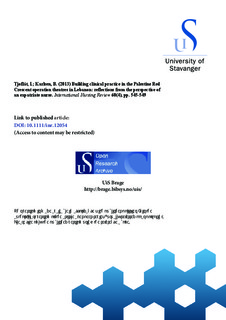| dc.contributor.author | Tjoflåt, Ingrid | |
| dc.contributor.author | Karlsen, Bjørg | |
| dc.date.accessioned | 2015-07-01T08:44:34Z | |
| dc.date.available | 2015-07-01T08:44:34Z | |
| dc.date.issued | 2013-12 | |
| dc.identifier.citation | Tjoflåt, I.; Karlsen, B. (2013) Building clinical practice in the Palestine Red Crescent operation theatres in Lebanon: reflections from the perspective of an expatriate nurse. International Nursing Review 60(4), pp. 545-549 | nb_NO |
| dc.identifier.uri | http://hdl.handle.net/11250/286141 | |
| dc.description | This is the peer reviewed version of the following article: Tjoflåt, I. and Karlsen, B. (2013), Building clinical practice in the Palestine Red Crescent operation theatres in Lebanon: reflections from the perspective of an expatriate nurse. International Nursing Review, 60: 545–549. doi: 10.1111/inr.12054, which has been published in final form at 10.1111/inr.12054. This article may be used for non-commercial purposes in accordance with Wiley Terms and Conditions for Self-Archiving. | nb_NO |
| dc.description.abstract | Aim: This paper, based on the experience of the first author as an expatriate nurse, aims to describe and discuss some aspects of collaboration that contributed to the building of clinical practice when implementing an operating theatre programme in the Palestine Red Crescent Society (PRCS) hospitals in Lebanon. Background: The operation theatre programme lasted for 8 months: 6 months in 2008 and 2 months in 2009. The programme was part of the partnership project ‘Quality of care in the five PRCS hospitals in Lebanon’ between the International Committee of the Red Cross and the PRCS Lebanon (PRCS-L) branch.
Findings: The essential aspects that may have contributed to the building of clinical practice in the operation theatre programme included the expatriate nurse and the Palestine Red Crescent operating theatre nurses working together over time as colleagues, the socio-cultural pedagogic perspective selected for the implementation and the collaboration with the management of the hospitals and counterparts in the PRCS-L branch. One should also note the human and structural issues that seemed to influence the implementation of the programme in a more negative way.
Conclusions: This experience may provide insight for other nurses into the importance of working as colleagues, selecting an appropriate pedagogic perspective and establishing productive collaboration with all partners when building clinical practice during a humanitarian mission. | nb_NO |
| dc.language.iso | eng | nb_NO |
| dc.publisher | Wiley | nb_NO |
| dc.subject | sykepleie | nb_NO |
| dc.subject | Libanon | nb_NO |
| dc.subject | Røde kors | nb_NO |
| dc.subject | humanitarian mission | nb_NO |
| dc.subject | international committee of the Red Cross | nb_NO |
| dc.subject | building clinical practice | nb_NO |
| dc.subject | nursing | nb_NO |
| dc.title | Building clinical practice in the Palestine Red Crescent operation theatres in Lebanon: reflections from the perspective of an expatriate nurse | nb_NO |
| dc.type | Journal article | nb_NO |
| dc.subject.nsi | VDP::Medical disciplines: 700::Health sciences: 800::Community medicine, Social medicine: 801 | nb_NO |
| dc.source.pagenumber | 545-549 | nb_NO |
| dc.source.volume | 60 | nb_NO |
| dc.source.journal | International Nursing Review | nb_NO |
| dc.source.issue | 4 | nb_NO |
